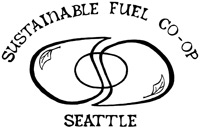What is Biodiesel?
Biodiesel is a direct diesel replacement. Made from refined vegetable oil, biodiesel is a renewable, domestic, healthy, environmentally safe alternative to fossil fuels. It is biodegradable, non-toxic and non-hazardous. Rudolph Diesel introduced the first diesel engine at the Exhibition Fair in Paris, France in 1898, fueled by peanut oil – the “original biofuel.”
Where Does Your Biodiesel Come From?
Our fuel comes from a variety of regional suppliers to keep your fuel close to home. The BQ-9000 certification is a voluntary fuel accreditation program that involves ISO 9000-type inspections and periodic fuel testing. The program includes: storage, sampling, testing, blending, shipping, distribution and fuel management practices. The certification process includes an application review and on-site inspection by independent auditors. Only a very small number of biodiesel producers hold the BQ-9000 certification.
The oil used in refining our biodiesel is from used cooking oil, canola and camelina crops. Canola is grown for livestock feed, however the added value is in the waste material which is processed into biofuel. Camelina is a common crop used in field rotation. It can grow in harsh conditions without the need for fertilizers while replenishing the soil. Traditionally a wasted crop once harvested, it now serves double duty as a highly efficient fuel.
Can Any Vehicle Run on Biodiesel?
Any diesel engine in good working condition can run on biodiesel without conversion. Biodiesel can also fuel diesel generators, boat motors, heavy equipment, and can be used as home heating oil.
Is Biodiesel Good for My Vehicle?
Biodiesel has a higher lubricity than petro-diesel, and has been shown to contribute to longer engine life. The solvent quality of biodiesel will remove any deposits left in your fuel system by dirty fuels. Biodiesel also has a higher cetane rating, which means it burns more completely than diesel. Vehicles tend to run quieter and more smoothly when fueled with biodiesel.
Will My Mileage Change with Biodiesel?
There should not be a significant change in your mileage when using biodiesel.
Is Biodiesel Good for the Environment?
Biodiesel itself is considered to be carbon neutral. During the life-cycle of the fuel, as much carbon dioxide is absorbed as is emitted. Using biodiesel in place of gasoline or petro-diesel significantly reduces your vehicle emissions. In comparing B-100 biodiesel to petro-diesel, the following figures have been provided by the EPA*
- Unburned hydrocarbons are reduced by 67%
- Carbon monoxide is reduced by 48%
- Particulate matter is reduced by 47%
- Sulfates are reduced by 100%
- Polycyclic aromatic hydrocarbons (PAH) are reduced by 80%
- Nitrated PAHs are reduced by 90%
*These figures are estimates. The EPA has no comparative results for gasoline vs. biodiesel emissions.
Biodiesel is a great way to reduce our dependence on fossil fuels, but completely escaping from the petroleum economy is nearly impossible. Unfortunately, there are still some non-renewable inputs necessary to get the fuel from the fields to your car’s tank. Therefore, Dr. Dan’s and the Sustainable Fuel Coop is committed to using the best quality locally sourced supply available.
Can I Blend Biodiesel with Petroleum Diesel (Petro-Diesel)?
Biodiesel can be blended with petro-diesel. If you are traveling and cannot find biodiesel, there is no problem in topping off your tank with petro-diesel. When buying petro-diesel, be aware that most diesel is only filtered to 30 microns. This means that the fuel may introduce particulates into your fuel tank, which biodiesel will clean out and move into your fuel filter. We recommend diesel filtered to at least 10 microns. If you do not see a filter on the pump, ask your retailer to install one.
I’ve Heard There Will Be Problems With My Fuel Filter – Is This True?
If you have been fueling with petro-diesel, its possible that diesel may have left particulates or residue in your fuel tank. This also applies if you are blending biodiesel with petro-diesel. Because biodiesel has a solvent quality, it will clean out any residue deposits and move them into your fuel filter. We suggest that after your first 2 or 3 tanks of biodiesel you check and change your filter. If you experience sluggishness or a loss of power, this is an indicator that your fuel filter is clogged and needs to be changed.
What About my Hoses?
It is very rare that there are incompatibility issues with hoses or gaskets. The few that we’ve seen here at Dr. Dan’s were in early 80’s vehicles with natural rubber hoses. There are no problems with synthetic hoses. If you have concerns, we have biodiesel-compatible hosing available for purchase.
What About my Vehicle Warranty?
OEM vehicle warranties are fuel neutral. This means that the vehicle manufacturer is not responsible for problems created by any bad fuel, whether that fuel is gasoline, petro-diesel or biodiesel. Some manufacturers designate a percentage of biodiesel (5-20%) “allowed” to maintain warranty on the fuel system components of newer vehicles. If someone blames a brake failure or problems with your doors on biodiesel tell them you know better and so should they. If you are looking at purchasing a car, email info@drdansbiodiesel.com if you have not found information about biodiesel compatibility or wish to have a used vehicle inspected.
What About Using Biodiesel in Winter?
Frost on your windshield does not mean that our biodiesel will gel. Dr. Dan’s biodiesel has been winterized to withstand normal winter use in the Puget Sound region. If you drive to and from work, you are heating your fuel. Just like putting a bottle of olive oil in the refrigerator, it takes time for biodiesel’s ambient temperature to drop to the point of gelling. If you drive a truck, your fuel tank is more exposed. Your vehicle’s fuel tank will reach ambient temperature sooner than a car whose mass surrounds the fuel tank.
General rule of thumb: when the weather has been cold enough long enough to freeze the ground solid, you need to take action to prevent your biodiesel from gelling. We suggest, during these cold spells, to blend petro-diesel (20%) with our biodiesel to prevent problems. When purchasing petro-diesel, make sure to verify that it is a winter blend. A winter blend petro-diesel has a lower chill point than other diesel blends. Also, look for a fuel filter on the side of the diesel pump. Petro-diesel that has been properly filtered is less likely to leave particulates in your fuel tank.
Fuel from Dr. Dan’s and the Sustainable Fuel Coop has been winterized, and should withstand normal winter use in the Puget Sound region. We will email cold weather advisories if the weather is too cold for winterized fuel use (Click here to sign up for our email list). (For more information on winter use, see our Winter Biodiesel page here)




Pingback: Dr. Dans Biodiesel Burns Green | Embargoed